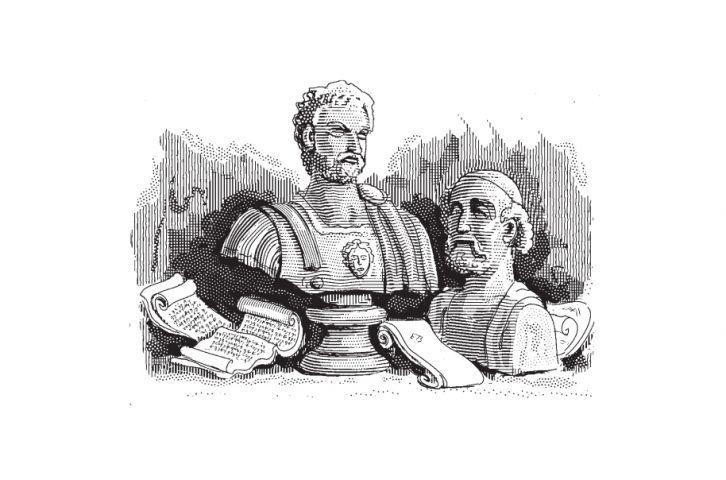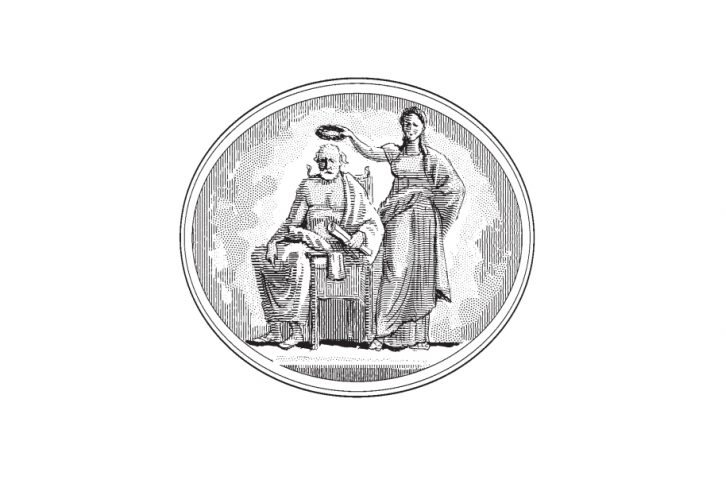Books Reviewed
A review of The Classical World: An Epic History from Homer to Hadrian
The subtitle of this book has it right: this is an epic history. At nearly 700 pages, it is lengthy but selective, structured around large themes, and distinguished by its vivid style. Like some of the best epics, it stops in medias res, leaving its audience to wonder what came next in the story and facing the challenge of figuring out what it all means.
The Classical World moves well as a narrative. Its 55 short, lively chapters proceed chronologically over nearly a millenium, from archaic Greece to the reign of emperor Hadrian, 117-138 A.D. But Robin Lane Fox, a historian at Oxford (who also consulted with Oliver Stone on his film Alexander and writes a gardening column for the Financial Times), has purposely not written a comprehensive survey with equal treatment of every era. Instead, he compresses history to concentrate on two periods that "have come to be seen as particularly classical": Athens of the 4th and 5th centuries, and the Rome of Julius Caesar and Augustus, from the 1st century B.C. to 14 A.D.
As an engaging conceit, Lane Fox periodically compares his views to what he imagines the emperor Hadrian would have thought about the same topics. The controversial emperor makes the perfect foil. He was deeply interested in the classical past, preferring, it seems, Greek antiquity to Roman. He was also an obsessive traveler, spending years traversing the provinces and visiting famous sites, while building a massive estate outside Rome whose many buildings and statues re-created memorable architecture and art from his far-flung expeditions. He reigned in the 2nd century after Christ, just when Christianity began to be institutionalized across the Roman world—the period that Edward Gibbon, in The History of the Decline and Fall of the Roman Empire, described as the happiest in history. Although this era is long before the end of the Roman empire, it serves as the end of Lane Fox's Classical World.
His narrative emphasizes political and military events over culture. The latter shapes, but does not predetermine, historical change, which revolves around issues of freedom, justice, and luxury, the themes most prominent in the Greek and Roman writers on whom we rely for so much of our knowledge of the ancient world. In his telling, the people whose actions mattered most were aristocrats, and Lane Fox confidently rejects any contemporary approaches to history that shift the focus away from them. Nor does he hesitate to stand in judgment of events. For example, the "major event" of the early decades of the 4th century B.C. was the "renewal of brutal domination by the Spartans, to be followed by the welcome collapse of their main power-base" (my italics). These events culminated in the bloody failure of the Spartan drive for power and the subsequent political vacuum in Greece, which opened the way for the wars of the Macedonian conquerors Philip II and his son Alexander the Great and for consequent, far-reaching cultural changes. (It would be unjust, by the way, to allow the harsh criticism of Oliver Stone's movie to diminish Lane Fox's scholarly authority.)
* * *
Democratic Athens during the 400s and 300s B.C.—the Classical Age of Greece—marks the highpoint in his evaluation of the ancient world. He is refreshingly direct in arguing for this view. He acknowledges that today, in the Western world, Athenian democracy cannot receive full approbation because it was a government legally restricted to men, and, like every other Greek regime, slave-holding. Still, it represented a political and social innovation of miraculous dimensions, without precedent in a world of monarchy and oligarchy and given its form by a leader who belonged to one of Athens's most aristocratic families. Freedom was every citizen's birthright, justice was dispensed by democratic courts, and spending on luxuries was as prominent in public works as in private delights.
The meaning of "classical" is obviously crucial to his interpretation. The term, like "archaic," derives from art history, and expresses judgments formerly applied to the aesthetic qualities of art in different periods. To be ungenerous to those who formulated this usage, archaic implied something like "art not yet developed enough for our tastes," while classical designated "art as good as it gets, as defined by us." Lane Fox has his own stimulating, idiosyncratic view, which makes religious skepticism and freedom of speech, including obscenity, the signatures of the classical age. The change from archaic to classical came, according to him, when Pericles and other upper-class intellectuals rejected traditional religious views, especially the common belief that angered gods were the cause of the community's troubles and defeats. Aristophanes' raunchy, biting parodies of almost everyone were "the true symptom of a classical age." Thucydides was a master historian because he excluded divine causation in his history of the Peloponnesian War; his realist account, as a result, delivers "the most instructive war in human history." (How curious, then, that Thucydides' infamous Melian Dialogue, the most cold-blooded presentation of wartime Realpolitik in Greek literature, does not rate a mention.) Plato was "the greatest prose writer in all world literature." Athens, all in all, was "the nearest to an ideal state in the classical world."
* * *
It is mostly downhill from Athens to Rome. To be sure, Lane Fox recognizes the many accomplishments of the Roman republic's leaders and thinkers; he is especially insightful in explaining why Cicero deserves our admiration. Nonetheless, by fighting each other for primacy in the 1st century B.C., the republican aristocrats squandered what freedom, justice, and luxury they and their fellow citizens had accrued over centuries of successful conquest. The "ungentlemanly gentlemen's agreement" that Julius Caesar, Pompey, and Crassus forged in 59 B.C. destroyed the roots of freedom in the republic. (Lane Fox never calls this arrangement by its customary, if inaccurate, modern designation, the First Triumvirate.)
Caesar, victor in the civil war, failed utterly to solve the political crisis that had destroyed peace and order in republican Rome. Astoundingly, however, his grand-nephew Octavian—"the most dangerous eighteen-year-old in the world," Lane Fox calls him—found a solution by creating the system we call the Roman Empire and taking the title of Augustus ("the Venerable One") in the process. If Mark Antony had won the struggle instead of Octavian, the author speculates, the world might have been different (especially, in my opinion, because Cleopatra had an innovative political vision). As things turned out, however, peace returned at an unconscionably high price: Augustus controlled freedom, justice, and luxury, despite his claim to have restored the Republic. Lane Fox thus agrees with Tacitus, another one of his heroes, and with the iconoclastic Roman historian Ronald Syme (who, if ever there has been transmigration of souls, was the modern incarnation of Tacitus), in regarding Augustus as a despot who created a family dynasty that bought off the masses and the army, while securing everyone's loss of freedom. The architectural monuments that beautified the capital city were in truth "marks of subservience."
By the time of Augustus, the Roman world had reached a nadir of violence and disorder, to which the emperor provided a more potent antidote than freedom. The situation did not improve under the emperors who followed, and Hadrian's rule proved no exception. It is not a compliment when Lane Fox wryly identifies Hadrian's deification of his dead lover, the beautiful youth Antinous, as the "most positive religious policy of any Roman emperor." Worse still, Hadrian made his own bloody contribution to freedom's deterioration with his "final solution" for the Jews of Judea. (Lane Fox is never reluctant to use an over-the-top expression in place of a less striking, if perhaps more historically justified, one.)
His description of what he sees as a long, sad decline is absorbing in its elaborate detail, from Alexander naming a new city after his dog, to Pliny the Younger describing "resentment among some of the better-off of the ‘bore' (taedium) of bringing up brats." As in all his books, he displays massive erudition. He has clearly absorbed more scholarship on ancient Greece and Rome than most ordinary mortals could hope even to skim. Yet the reasons he adduces for the decline are not always easy to discern amid the wealth of information. A clue to his interpretation lies in his decision to make Hadrian his "assumed reader." Despite his extensive education and undoubted learning, the emperor, we are told, was not a genuine intellectual but only a "man of taste." (Here, as countless other times in his text, Lane Fox is satisfied to encase a provocative label in quotations rather than explain what he means, which I think serious readers will find exasperating.) This seems to mean that Hadrian lacked the knowledge and insight to grasp the classical; he could not rise above "classicizing."
Classicizing, according to the author, is what characterizes the ancient Western world after Athens in its Golden Age; the term means ignorance and misunderstanding of the classical. Throughout the book, when Lane Fox imagines Hadrian's opinions about certain events or individuals, he makes it clear that he believes the emperor would not have been well-informed, or could not have analyzed the situation correctly, at least by contrast to a scholar today. I confess to qualms about this view. To say nothing of the intrinsic difficulty of putting ourselves inside the head of a Roman emperor, I think it could be an act of hubris (an error that scholars of antiquity should recognize better than anyone) to assume, even with the evidence of archaeology, anthropology, and other modern disciplines, that we are better positioned than Hadrian to understand the genuinely classical.
* * *
For one thing, I feel sure that Hadrian would have understood an astonishing event that Lane Fox omits. Near the end of the 4th century B.C., the Athenian body politic voted unprecedented honors to Antigonus the One-Eyed and his son Demetrius, the Macedonian military commanders who removed the tyranny that had suppressed Athens's traditional democracy for nearly a generation. During this time, the traditional gods had failed to grant Athenians' prayers to restore their ancestral constitution. Since Antigonus and Demetrius did what the old divinities could not, it made sense for the Athenians, in a vote, to elevate these men to the rank of "savior gods." Historians today debate whether this deification was a genuine expression of religious gratitude, or merely insincere flattery, or a mixture of these and other motives. In any case, this amazing—and democratic—event marks the real beginning in Greek history of seeing a living human being as a god on earth who brings salvation. It therefore deserves a significant place when considering the Mediterranean background of the doctrines that energized early Christians. Was Athens still classical when its voters made gods of living men? Presumably not, by Lane Fox's criteria. How then should we classify it?
Lane Fox closes his epic with the allusive comment that "Christians…would then overturn [Hadrian's] world by antiquity's greatest realignment of freedom and justice…." Was there somehow an affinity in the nature of faith between non-classical but still pagan Athens, once the paragon of freedom, and the Christians of the early Roman empire? For me, that is the most fascinating of the big questions that this spirited book leaves open.




